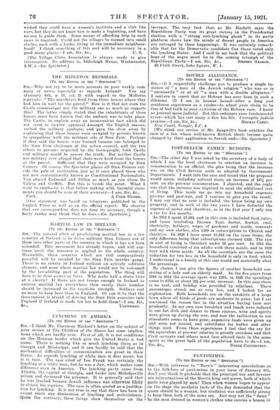POST-BELLUM FAMILY BUDGETS. [To THE EDITOR OP THE " SPECTATOR."]
SIR,—The other day I was asked by the secretary of a body of which I am the local chairman to sanction an increase in remuneration to an official, the plea being that the increase was on the Civil Service scale as adopted by Government Departments. I went into the case and found that the proposal would mean, including natural rises, an increase of 187i per cent. on the pre-war remuneration. I objected, and the reply was that the increase was required to meet the additional cost of living. This made me go into my household expenses pre-war and post-war, and I venture to give you the result. I may say that no rent is included, the house being my own property, and in each of the two years I have deducted the expense of motor and chauffeur, as in the first year I only ran a car for five months.
In 1913 I spent £1,203, and in this sum is included food, rates, and taxes (excluding Income Tax), doctor, dentist, coal, electricity, holidays, wages of gardener and maids, renewals and my own clothes, also £169 in subscriptions to Church and charities. In 1920 I have spent £1,842 on the same items, the only difference being that subscriptions claimed 2326. The rise in cost of living is thereforo under 55 per cent. In 1913 the household consisted of six adults with three maids, and in 1920 four with three maids. As all the essentials are the same tho reduction for two less in the household is only in food, which I understand in a family of this size would not materially alter tho percentage.
By chance I can give the figures of another household con- sisting of a lady and an elderly maid. In the five years from 1910 to 1914 the average spent was £201, in 1920 the spendings came to 2255, or about Vi per cent. increase. In this case there is no rent, and holiday was provided by relations. There percentages struck me as very low, and I looked for an explanation. Both households are on the outskirts of a large town where all kinds of goods are moderate in price, but I am convinced the reason lies in the situation having been met prudently. In my own case breakfast and lunch were reduced to one hot dish and dinner to three courses, wine and spirits were given up during the war, and now the inclination to use stimulants seems to have gone; expensive foods were given up and were not missed, and substitutes for butter and other things used. From these experiences I feel that the cry for the equivalent of pre-war salaries is greatly overdone and that Civil servants and others must face altered facts in the same spirit as the great Isulk of the population have to do.—I am,






























 Previous page
Previous page